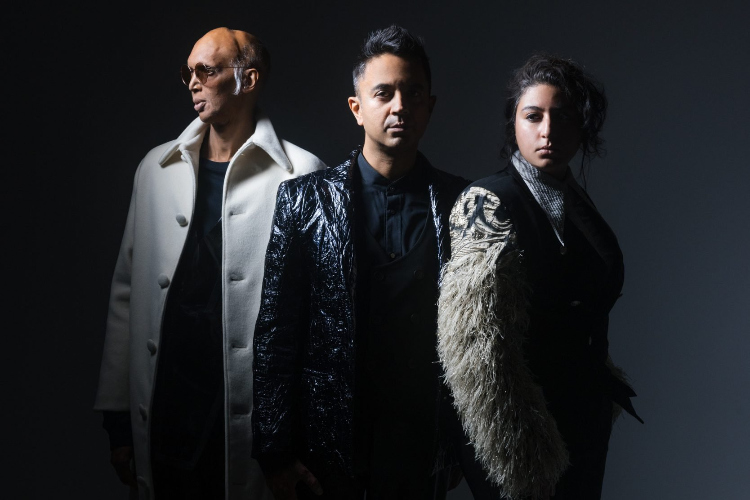|
Getting your Trinity Audio player ready…
|
Far too often, people equate avant-garde expressionism to high-volume proclamations with flurries of notes. To an uninitiated listener, this perspective is understandable when one considers John Coltrane’s sheets of sound, Cecil Taylor’s densely clustered notes, and Peter Brotzmann’s rough, bluesy cries. But an isolated focus lessens the significance of the artists who have made this music as it overlooks the most critical part of their craft; the ability to take resources at their disposal to push music into new areas. With this broader outlook, one is reminded there is nothing about creative music that expels moments of silence and peacefulness. Indeed, there is a long history of freer recordings mining this area of tranquility. Vijay Iyer, Arooj Aftab, and Shahzad Ismaily’s Love in Exile (Verve, 2023) reminds of that lineage while providing a strong comment on its continued vitality.
To better understand Love in Exile, one should first examine what the recording is not. Throughout the recording, Iyer, Aftab, and Ismaily provide enchanting dialogues. It’s easy to assume they are preconceived, but they are not. Instead, the magic of the moment is intrinsic to their conversations. But the absence of an existing plan also does not mean the artists make things up as they go along or rely on luck. Instead, one can sense each musician’s deep study and deep listening melding to produce something unique to the moment but not emergent from nothing. This aspect is precisely why the trio refuses to call their work “improvisational” and instead prefers the term “live composing.”
It is also erroneous to assume Love in Exile portrays some mere amalgamation of jazz and South Asian music. As all three artists are of either Pakistani (Aftab and Ismaily) or Tamil (Iyer) descent, there will always be some shared features of their heritage incorporated into their works. But even the most openly subcontinent-influenced element on the album – Aftab’s vocals in Urdu – serves more than underscoring cultural ties. By not sharing a narrative in a directly linear way, even while permitting the stories’ essence to remain, she shapes her voice to sound more like a trumpet or saxophone. In doing so, she shifts the trio in a new direction. Similarly, Iyer builds upon his impressive experiences – with Wadada Leo Smith, Roscoe Mitchell, and others – and his love of Alice Coltrane’s work to imbue the trio’s work with a spiritual weight. Holding it all together, even as he pushes boundaries, is polymath Ismaily switching between bass and synths.
Love in Exile is a breathtaking recording that ignores labels to present a broader truth on the beauty of art and music. As shown at Newport, the trio is particularly enrapturing live, for it is in the live performance that the listener is enveloped in the surroundings and made a part of the moments of creation.
PostGenre: There is something about Love in Exile that is oddly reminiscent of some of John Coltrane’s later work and some of Alice Coltrane’s work in a way that goes beyond the fact that some of their music also had South Asian influences. The shared use of freer form and speaking to some higher power seemingly unites their music with this trio’s. Do you feel that is a fair assessment?
Vijay Iyer: Yeah, I’m glad you noticed that. I’m not sure I can draw a direct line between the works of John and Alice Coltrane and this trio.
Both John and Alice have had such an extreme influence on me that I don’t even know where to begin. But I think Alice Coltrane – Svāminī Turīyasaṅgītānanda, as she is called – created a space for very different notions of form, different approaches to time, and different temporalities. She gave a sense of cascading infinities that you can feel in her music. Her music makes you feel like you could sit in it all day, and it would be fine. You wouldn’t run out of feelings for it. It would still sustain you, hold you, nourish you, and rejuvenate you. It could both calm you and trouble you. Her music gives you all these feelings together.
I remember this line from an interview – actually, they played it at her funeral- where she says, “The key to being an artist is giving abundantly.” It always gives me chills to think about that. She offered and shared such profound wisdom with us. Her work has mattered to me and shaped me in a way that is audible with this trio, perhaps more than in anything else I’ve ever done.
PG: Though there are also the connections to South Asian music. For one, Arooj sings in Urdu. But, often, she seems to approach notes more like an instrumentalist than a vocalist. Do you feel that is a fair assessment of her contributions, and if so, do you find playing with her to be similar to working with an instrumentalist, say, Wadada Leo Smith?
VI: Playing with Arooj is actually strikingly similar to playing with Wadada. I think the trumpet is an excellent point of reference for her vocals. I’ve been comparing [Love in Exile] to [Miles Davis’] In a Silent Way (Columbia, 1969). This trio feels similar to the music on that album, with Arooj functioning in a similar role musically as Miles did. Others seem to be noticing that as well. John Murph, for one, mentioned it in his Downbeat review of our album. And Arooj has even said in interviews that she is using these phrases – fragments of lyrics – as an instrument. She is using them as colors to paint with. She’s not focusing as much on using lyrics to tell a story.
PG: However, that is not to say the lyrics hold no significance.
VI: Right, it’s not that they have no meaning. They’re very specifically chosen and then repurposed in a way so meaning is not lost. But the lyrics are only part of the story; they’re only part of what’s happening. The lyrics inform the choices Arooj makes, but she functions and shows up in the music like an instrumentalist, which I greatly cherish. When I say that, it’s not to devalue her as a vocalist. It’s more like we’re all singing and all playing. That’s what it feels like.
PG: And as to the third in your trio, you first met Shahzad when you were in Bunt Sugar together, correct?
VI: That’s right, [drummer] Qasim Naqvi brought Shahzad into Burnt Sugar.
PG: Do you feel your time together in Burnt Sugar shaped your work with this trio?
VI: It’s funny because I barely knew Shahzad back when we were in Burnt Sugar, even though we spent a lot of time together. He’d often show up but then disappear. He does now too, actually. But I didn’t get to know him back then at all.
But Burnt Sugar had an ethos that came from Butch Morris. It was this idea of summoning music from nothing. With Burnt Sugar, [founder] Greg [Tate] was doing a punk rock version of what Butch was, which was already a bit of a stunt. Butch did conduct us quite a few times, including on an album called The Rites: Conductions Inspired by Stravinsky’s Le Sacre du Printemps (Avant Groidd Musica, 2003). I think Shahzad and I both absorbed that process of summoning music. Of course, we also experienced that process from many other places as well- I even worked with Butch directly – but it may have come partly from Burnt Sugar.
PG: Of course, the live compositional process would also seem to be a part of your work with Roscoe Mitchell and Wadada Leo Smith.
VI: Right. With both Roscoe and Wadada, you often needed to create a path musically between pieces or from one sonic zone to another sonic zone. And those compositional paths had to be made in real-time, which is connected to how this trio live composes. I think too many things get lumped together as free jazz or free improvisation. But, in reality, the artist is creating structure, creating order, and creating directionality. It wasn’t just that ecstatic – play whatever you feel at any time – model that many people wrongly associate with free jazz. In all three cases, we do something more deliberate and future-oriented.
PG: This is what makes the term “live composing” that the trio uses perhaps better than “improvising” given the misconceptions many seem to have about composing in the moment.
VI: It’s very difficult to disrupt, undo, and push back against the misconception that when they create music in the moment, musicians are simply making it up as they go along. Those thoughts keep coming at you.
PG: Why is that?
VI: It’s part racism and part capitalism. Actually, it was Wadada who first surprised me with the idea of discarding the term “improvisation.” I’ve told this story before, but he and I once did a duo performance in Chicago, hosted by the Chicago Symphony. There was a composer in residence who was curating these concerts, and we did a pre-concert Q&A with him where we sat at a table with microphones in front of us. The composer in residence asked us, “What percentage of what you do is improvised, and what percentage is composed?” Those kinds of questions make me suspect. Why do you want to know? What are you actually asking? What’s beneath this question?
Before answering the guy’s question, Wadada turned to me, put his hand over the mic, and went, “Watch my back.” He then turned the mic and said, “Not too long ago, I picked up that word, improvisation, and I took it out into my backyard. I beat it to death until there was nothing left but dust.” [laughing]. We don’t have time for the term “improvisation” anymore. It’s not doing us or our music any favors. It’s been turned into something that devalues everything we do.
PG: Of course, the moderator is a classical musician and Western classical music’s insistence upon pre-written pieces makes many musicians who create it struggle to compose. As someone who makes both music more rooted in “jazz” and contemporary classical, do you see a significant difference in working in those two areas?
VI: Of course, it’s a huge difference because those are very different players.
Western classical musicians have very different training, use different emphasis, and have a different awareness. They are generally not composers by nature. There is a big difference between playing with musicians who can create and those who merely interpret another’s creation. If you’re playing with people for whom that right to create has been taken away – that capacity nearly abolished – what can you do with them? [Western classical musicians] can play the music you put in front of them and find ways to express themselves with other people’s music. But they are rarely empowered or invited to make their own music. They either can’t make their own music or are afraid to; that’s the biggest difference.
As a composer, working with artists who don’t have their own compositional skills presents a problem not present when you work with other composers. As they only play what is on the written page, how do you elicit from those musicians something that will nonetheless feel like it’s happening in the present? Is that even possible? And, if so, how do I make it happen? Those are the ongoing questions for me.
The trio of Vijay Iyer, Arooj Aftab, and Shahzad Ismaily are currently on tour. They will be performing at the University of Texas’ Bass Concert Hall on Friday, September 29, 2023.
‘Love in Exile’ is now available on Verve Records. It can be purchased from the trio’s website. You can learn more about Iyer by visiting his site.







Leave a Reply